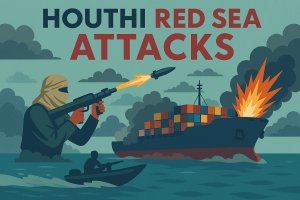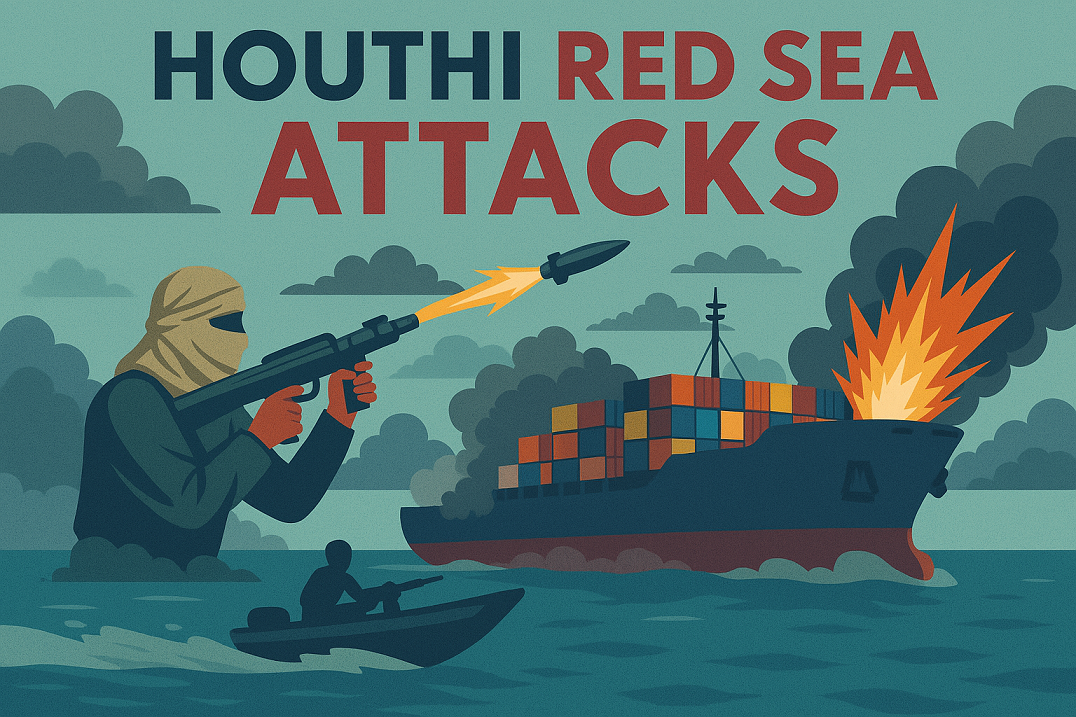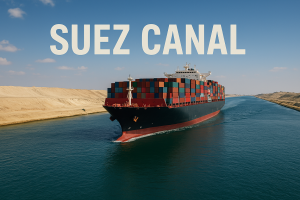The Houthi attacks on ships in the Red Sea have garnered significant attention due to their impact on international maritime security and global trade.
The Houthi attacks on Israeli and American commercial ships in the Red Sea are a strategic effort to pressure Israel into halting its military and war offensive in Gaza. By targeting vessels linked to Israel and its allies, the Houthis aim to disrupt global trade routes and inflict economic costs, drawing international attention to the war in Palestine. These maritime assaults serve as both a show of solidarity with Gaza and a tactic to leverage geopolitical influence, forcing Israel and its supporters to reconsider their actions through heightened security and economic repercussions.

The Red Sea, a vital corridor for global commerce, has witnessed escalating tensions due to attacks on commercial vessels by Yemen’s Houthi group. These incidents have raised concerns about maritime safety and the stability of international shipping routes. Understanding the motives behind these attacks and their broader implications is crucial for stakeholders across the maritime industry.
Background on the Houthi Movement
The Houthi movement, officially known as Ansar Allah, emerged in the 1990s in northern Yemen. Initially, a religious and political group representing the Zaidi Shia minority, the Houthis have since evolved into a formidable armed faction. They seized control of Yemen’s capital, Sanaa, in 2014, leading to a protracted civil war involving regional and international actors.
Houthi Attacks on Maritime Vessels
Since late 2023, the Houthis have intensified their attacks on commercial and naval vessels in the Red Sea and the Gulf of Aden. These assaults have involved various tactics, including:
-
Anti-Ship Missiles: Targeting vessels with missiles, causing damage and casualties.
-
Unmanned Surface Vehicles (USVs): Deploying explosive-laden drone boats to strike ships at the waterline, complicating defensive measures. Reuters
-
Hijackings: Seizing vessels and their crews, as seen in the November 2023 hijacking of the Galaxy Leader.
These attacks have resulted in the sinking of at least two vessels, the seizure of another, and the deaths of multiple seafarers.
Motivations Behind the Attacks
The Houthis have cited several reasons for their maritime assaults:
-
Solidarity with Palestinians: Expressing support for Gaza during conflicts involving Israel. The Washington Institute
-
Opposition to Western Influence: Challenging the presence of U.S. and allied naval forces in regional waters.
-
Strategic Leverage: Using attacks to gain political and military advantages in the Yemeni civil war.
Impact on Global Shipping and Trade
The escalation of Houthi attacks has had significant repercussions:
-
Disruption of Shipping Routes: Major shipping companies have rerouted vessels around the Cape of Good Hope, instead of the Suez Canal, leading to increased transit times and costs.
-
Economic Strain: Insurance premiums for vessels transiting the Red Sea have surged, reflecting the heightened risk.
-
Environmental Concerns: The sinking of ships, such as the MV Rubymar, has raised alarms about potential ecological damage due to oil spills and hazardous cargo.
International Response
In reaction to the Houthi threats, the international community has undertaken several measures:
-
Military Operations: The U.S. and the U.K. have conducted airstrikes targeting Houthi positions in Yemen to diminish their operational capabilities.
-
Naval Coalitions: The establishment of Operation Prosperity Guardian, a U.S.-led multinational coalition, aims to safeguard maritime navigation in the Red Sea.
-
Diplomatic Efforts: The U.S. has sought enhanced U.N. authority to intercept shipments suspected of supplying arms to the Houthis. The Guardian
Latest Developments and Future Outlook
As of early 2025, the situation remains fluid:
-
Ceasefire Impacts: Following a ceasefire in Gaza, the Houthis announced intentions to limit attacks on international shipping, though skepticism persists regarding their commitment.
-
Continued Vigilance: Despite diplomatic efforts, the potential for renewed attacks necessitates ongoing international naval presence and cooperation.
-
Regional Stability: The trajectory of the Yemeni civil war and Iran’s involvement will significantly influence the future security landscape of the Red Sea.
Conclusion
The Houthi attacks on ships underscore the intricate interplay between regional conflicts and global commerce. Ensuring the safety of vital maritime corridors like the Red Sea demands coordinated international efforts,maybe also to end the war in Gaza.
The Houthi attacks on Israeli and American commercial ships in the Red Sea are a strategic effort to pressure Israel into halting its military offensive in Gaza. By targeting vessels linked to Israel and its allies, the Houthis aim to disrupt global trade routes and inflict economic costs, drawing international attention to the war in Palestine. These maritime assaults serve as both a show of solidarity with Gaza and a tactic to leverage geopolitical influence, forcing Israel and its supporters to reconsider their actions through heightened security and economic repercussions.
FAQs
What are the Houthis’ main targets in their maritime attacks?
The Houthis have targeted various vessels, including those linked to Israel, the U.S., and their allies, as well as indiscriminate attacks on commercial shipping.
How have shipping companies responded to the increased threats in the Red Sea?
Many companies have rerouted their vessels around Africa’s Cape of Good Hope to avoid the Red Sea, resulting in longer voyages and higher costs.


